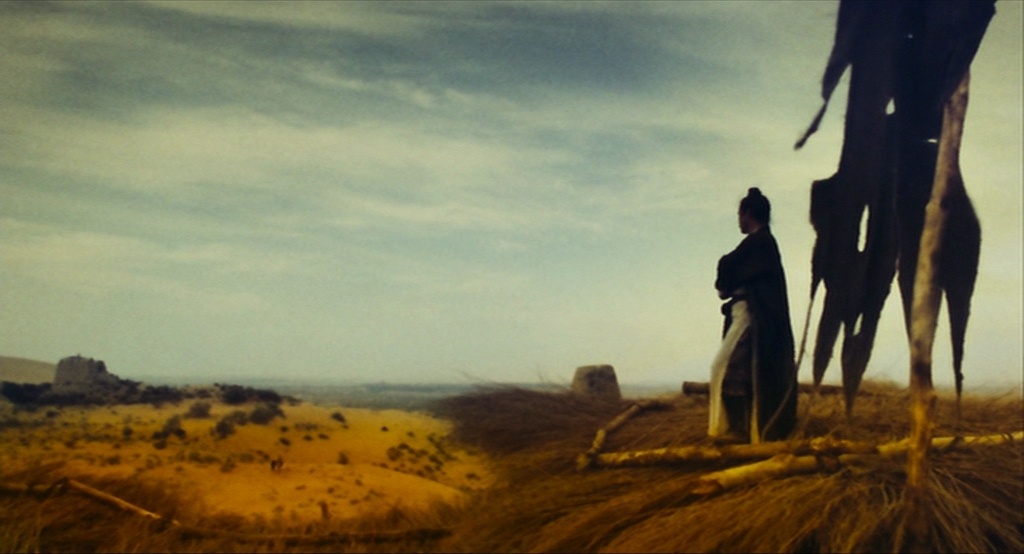Hong Kong, 1994
Directed by Wong Kar-wai
With Leslie Cheung (Ouyang Feng), Brigitte Lin (Murong Yin/Murong Yang/the Failure-Seeking Woman), Tony Ka Fai Leung (Huang Yao-shi), Tony Leung Chiu-wai (The Half-blind Swordsman), Jacky Cheung (Hung Chi), Maggie Cheung (Feng’s Lover)
The four seasons of the year and a year in the life of Ouyang Feng: this is the time frame of this tale from the ancient times of China. Ouyang Feng has left his county to settle at the edge of a desert and makes a living as a troubleshooter for the local community and people who feel they need him. His service comes down to assassinate whoever is deemed a troublemaker, though he often hires someone else to do the job. He lives on his own, barely gazing the impressive landscape around him and always browsing the traditional almanac.

The spring brings to his door a strange man named Murong Yang. He vows to kill a man who failed to marry his sister, Murong Yin, but this demand raises two difficulties: the man is Feng’s only friend, Huang Yao-shi, and the sister can’t countenance her brother’s cruelty and in fact wants to kill him. The outcome of this family clash of wills is the disturbing realization by Feng that the brother and the sister are the same female person whose madness eventually drives her to embrace another identity, an errant lady seeking fights and failures.
Summertime welcomes a swordsman slowly becoming blind and looking for money to go back to his native land; the contract he signs demands he fights a posse of bandits who are so numerous and so fierce he loses his life in the job.
With autumn another lonesome but younger and less experienced fighter comes; he also fights the bandits, with more success but at the end chooses to leave the place because he is afraid to look like Feng. The troubleshooter spends the winter traveling to find out more about the half-blind swordsman but the episode is rather a walk down the memory lane that features the woman Feng used to love, till she instead married his brother, as well as Huang Yao-shi who is her confidant and listens to her regrets and sorrows, till sadness eventually kills her.
Actually no summary can properly reflect an intricate narrative that centers on Feng’s feelings and puts the emphasis on the haunting memories the main character is obsessed with, an obsession that is shared by other characters, from the half-blind swordsman hoping to see again peach trees (and a wife) to the poor peasant girl keen on avenging her brother, from Huang Yao-shi thinking of his past lovers and friends (a lot which includes the half-blind swordsman) to Feng’s lover who can’t help thinking about him.
The anecdote that anchors the first sequence, the usual spring meeting between Feng and Huang Yao-shi, showcases this narrative thread in a discreet but clever way: Huang Yao-shi brings a gift from a common friend, a jar of wine that has the ability to make the drinker forget everything. It would be great to forget all one’s past so as to make a fresh start every morning. Feng is unconvinced and the winter episode reveals the truth about the wine and the friend in a poignant development highlighting how memories are impossible to cast away regrets pervade our minds (a fact Feng, as a perfectly hard-headed and cynic man, embraces in his own way, by claiming the best way not to be rejected by other people is first to reject them and then by abruptly changing his life a second time, burning his home at the end to go home).
A fragmented montage and a carefully worded, first person-based text let the sad feelings seep through the successive plots and color this take on the wu xia pian genre with a nostalgic and romantic tinge rather unexpected for the genre, whose stylistic features are also challenged by the singular environment where the story takes place. Sand and dust, sun and heat, scarcity and cruelty, all these elements give the shots an air of American western plumped down in China’s majestic landscapes, which still retain their magical power (see the recurring images of ripples on the surface of a lake or of people waiting with their feet inside water, fueling a sense of poetry and mystery that has not much to do with a Western flick but fits well with Chinese tales).
In “Dung che sai duk – Ashes of Time”, sword fights get a bold but unusual visual stylization, with slow-motion, slightly out of focus shots, images that are rather not bright and pristine, in another departure both from the rest of the film’s narration and from many films of the kind. The wu xia pian director Wong Kar-wai is directing feels like a conventional opportunity to keep exploring personal themes that appear in his other works, especially “A fei zheng chuan – Days of Being Wild” (1990), and stands out as an unorthodox and beautiful feature, where swordplay is transcended by the lyricism of deeply emotional characters lost in landscapes and pictures that look like no others.

